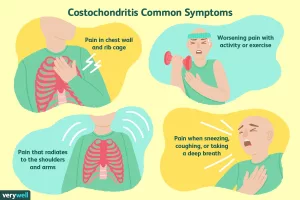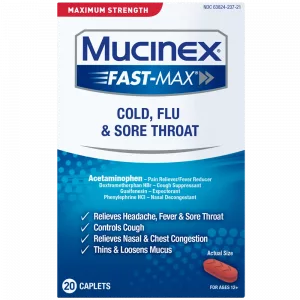That “Wait, Is There Ibuprofen?” Moment
At first, I thought it was nothing… Just a bit of congestion from last week’s weather whiplash, you know? Then the classic spiral: cough, sinus pressure, and—surprise!—that achy “just run over by a truck” vibe. So, I reached for my trusty Mucinex, barely awake, barely thinking—just hoping to kickstart my day. As I shook the bottle, a question hit me. Does Mucinex have ibuprofen already in it? Because honestly… Wouldn’t that just make things so much easier? Pop one pill, tackle the pain and the goop? Maybe you’ve had that same thought at 2 am while rummaging through the medicine cabinet, half-asleep and a little desperate.
Let’s pull up a chair and dig into what’s actually in your Mucinex box. We’re going to talk honest, no-jargon answers—plus a few “learned the hard way” stories—so you can feel waaay more confident the next time your chest feels like a stormy swamp. Ready?

Here’s the Quick Answer
So, Does Mucinex Have Ibuprofen?
Straight up: No, Mucinex does not have ibuprofen in it. Nada. Not the regular kind, not the DM, not the Fast-Max. The main ingredient in classic Mucinex is guaifenesin, which is an expectorant—a fancy word for “helps your body get rid of chest gunk.” That’s it. No ibuprofen, no Tylenol (acetaminophen), no hidden painkillers riding shotgun.
If you’ve ever wondered about other active ingredients, you’re not alone. People sometimes confuse brands or assume everything multi-symptom comes bundled together. If you’re curious what else is packed into different Mucinex types, take a peek at Does regular Mucinex have acetaminophen—super helpful if you’ve ever squinted at medicine labels in the middle of the night, halfway convinced you might be overdosing on painkillers by accident.
Mucinex vs. The Painkillers: Let’s See It Up Close
| Mucinex Product | Main Ingredients | Contains Ibuprofen? | Contains Acetaminophen? |
|---|---|---|---|
| Regular Mucinex | Guaifenesin | No | No |
| Mucinex DM | Guaifenesin, Dextromethorphan | No | No |
| Mucinex Fast-Max (some versions) | Guaifenesin, Acetaminophen, Dextromethorphan, Phenylephrine | No | Yes (some) |
Yep—no ibuprofen hiding in the shadows. If pain and fever are your main battles, you’ll need to add ibuprofen (or acetaminophen) separately. But—don’t just take my word for it; it’s also confirmed by current pharmacist-backed breakdowns and what you’ll find on official Mucinex ingredient lists.
Have You Ever Mixed Them?
I used to assume you couldn’t “mix” cold meds and painkillers. I was sure there’d be some wild, dangerous reaction. Spoiler alert: Nope! I double-checked after a rough cold a year ago—bless the pharmacists at my local grocery store—and felt like a genius (or at least not a hypochondriac) when I found the combo actually makes sense for lots of people. Let’s talk about that combo for a second.
Mixing Mucinex and Ibuprofen
Can You Take Them Together?
Short answer? Yes… You can absolutely take Mucinex and ibuprofen at the same time. They don’t clash. There’s no scary label warning if you use your normal, recommended doses. Ibuprofen goes after pain, headaches, and fever; guaifenesin (that’s your Mucinex) does the mucus-busting. They’re totally separate teams—like the offense and defense on a football field. They both want you feeling better, they just handle different symptoms.
That’s not just “my friend said”—it’s exactly what you’ll find if you search does mucinex have ibuprofen and all the trusted health libraries.
A Little Story…
So, last winter, I had one of those All Of The Above colds: pounding head, the kind of cough people give you side-eye for in line at Target, plus a chest so tight I sounded like a poorly-tuned saxophone. I did what every good health nerd does… tried “toughing it out,” then caved and combined Mucinex with my usual ibuprofen dose. Magic? Not quite. But it did mean I could breathe deeper and actually manage to nap on the couch. No weird symptoms, no regrets. (I did drink a ton of water, though. I’ll talk about why that’s a smart move in a sec…)
What About Special Mucinex Editions?
Let’s dig a little deeper: Maybe you grabbed “Mucinex DM” or “Severe Cold” or “Fast-Max.” Still wondering, does mucinex have ibuprofen in these? Same answer—nope, ibuprofen hasn’t snuck in. Some types do contain acetaminophen (the active med in Tylenol), which is another pain reliever and fever-fighter. So, if you grab one of those multi-symptom bottles, you shouldn’t add extra Tylenol to the mix—overdose alert! Double check that with Does regular Mucinex have acetaminophen if you’re feeling cautious (which, honestly, is smart).
Why the Confusion?
Medicine Aisle Overload
Maybe you’ve been here: standing in the cough and cold aisle at the drugstore, scanning a wall of boxes. Brands like “Night,” “Day,” “Sinus-Max,” “Severe Cold,” “Congestion+Pain.” Who names this stuff? It gets even trickier when every company sells a “multi-symptom” flavor. But here’s the scoop—ibuprofen almost never shows up in multi-symptom OTC cold medicines in the US. Acetaminophen is way more common in those formulas. So unless your box says “contains ibuprofen,” you can assume…
Nope, it’s not there. If you want the congestion-busting power of guaifenesin and the pain-blasting of ibuprofen… grab two bottles. (Or, you know, the generic versions, because those brand-name prices are something else.)
But How Does Guaifenesin (Mucinex) Even Work?
Mucus-Busting 101 (In Plain English)
You’re not here for a chemistry class, but… understanding this helps. When you take Mucinex, what’s happening inside? Guaifenesin—its main star—works by thinning and loosening up the mucus in your lungs and airways. Kind of like adding a little warm water to honey to make it flow better. This means you’ll cough stuff up more easily, and (eventually) that heavy-chest feeling gets a lot lighter. According to research on guaifenesin’s action and breakdown in your body, it works both by stimulating a reflex from your gut to your lungs and acting directly on those stubborn mucus glands.
Is it a miracle fix? Not always. There’s some debate about just how much it helps with acute (brand new) coughs vs. post-infection coughs or chronic bronchitis. But… if it helps you clear that stuff and breathe easier (as it does for so many), that’s a win. And at least you know it’s not packing secret pain meds.
And Side Effects? Good Question.
Mucinex is pretty easy on your system—sometimes you’ll feel a little nausea, dizziness, or headache. I once took it on an empty stomach and got a tad queasy… lesson learned. The main warning: drink plenty of water. That helps the medicine work, and helps your body flush out the sludge. (It’s also the oldest trick in the “mom’s advice” handbook… But she was right.)
Playing It Safe—What to Watch For
If You’re Adding Ibuprofen
Ibuprofen (Advil, Motrin) is a great pain and fever reliever—if your stomach can handle it, anyway. The big things? Take it with food to cut down on tummy aches, don’t overdo the dose (read the label, please!), and stop if you notice any stomach pain, black stools, or weird bruising.
If you or someone you love has ulcers, certain kinds of kidney or heart issues, or is pregnant, ask your doc or pharmacist first. Better safe than sorry, right?
What If You Accidentally Double Up?
Let’s say you grabbed a Mucinex Fast-Max (which has acetaminophen), and then also took Tylenol for the fever. Oops… That could add up to too much acetaminophen—same goes if you mixed cold meds with Nyquil or another pain reliever product. Too much acetaminophen can mean serious trouble for your liver. This is where knowledge is power. Before tossing back another capsule, double check the ingredient panel or peek at Does regular Mucinex have acetaminophen.
Pro-Tip: Stay Hydrated
Here’s where I sound like every health blogger ever…and your grandma: Drink more water when you’re sick! Mucinex (and ibuprofen) works better when you’re hydrated. Plus, all that coughing and blowing your nose can dry you out anyway. So, keep that water (or herbal tea, or even brothy soup) flowing.
When You Need More Than Mucinex
Know When to Call for Backup
Honestly, most regular chest colds and sinus gunk clear up with a little time, rest, soup, and—if you’re me—every episode of a reality cooking show ever. But if you’re still wiped out or coughing your head off after a week, running a high fever, or having trouble breathing? Time to see a real-live doctor. Sometimes there’s an asthma flare, pneumonia, or another weird twist that no pill from the drugstore will fix.
And if you’ve got other health stuff going on—like you’re pregnant, or you have a gnarly history of stomach ulcers or allergies—check with your healthcare team before mixing meds. A quick phone call saves a lot of headache (sometimes literally).
My Favorite Cold-Day Routine
Here’s what my “get better quick” routine looks like: A big glass of water, a warm blanket, Mucinex for my cough (when the chest stuff hits), some ibuprofen with breakfast if my body’s achy, and zero guilt about spending half the day in bed watching old sitcoms. Seriously, rest is medicine, too.
Let’s Wrap This Up…
So—let’s quiet that nagging question in your head: does mucinex have ibuprofen? Nope, it sure doesn’t. And that’s actually smart, because you can pair them together (if you need to) without risk… as long as you follow the usual “don’t go wild on the dosages or mix too many products” rules. Mucinex’s claim to fame is fighting thick, stubborn mucus—not pain or fever. If you want both reliefs, you’ll need to add ibuprofen (or Tylenol, if that’s your preference) on your own. Super important: check if you’ve accidentally grabbed a combo product with acetaminophen before adding another pain med—peek at things like does mucinex have ibuprofen and Does regular Mucinex have acetaminophen to double-check.
Above all: treat yourself with kindness and common sense next time a cold hits. Take that nap. Drink some tea. Double-check your medicine, and know you’ve got more control than you think. Have you ever played “ingredient detective” in the medicine cabinet? Or have a killer home recipe for conquering a stubborn cough? I’d seriously love to hear about it. Drop your stories below—we’re all just figuring this out as we go.
Stay healthy, stay curious, and may your next cold be as short and drama-free as possible.
























Leave a Reply
You must be logged in to post a comment.